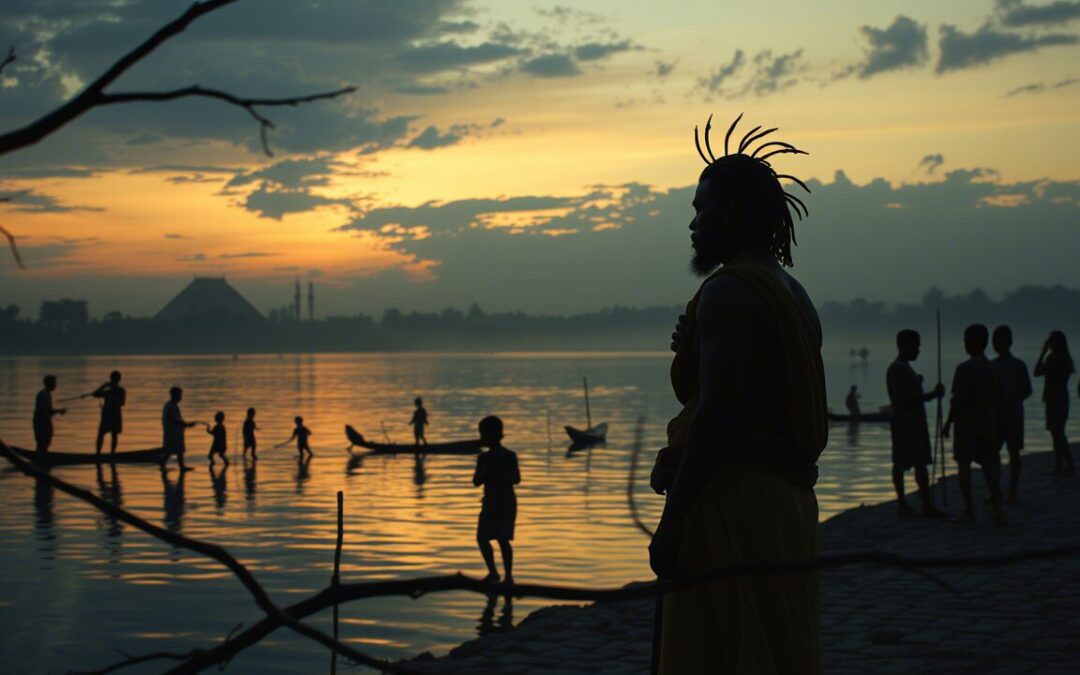The Shadow of the Nile: A Tale of Blood, Betrayal, and Belonging in Post-Independence Uganda
In The Shadow of the Nile , the majestic yet divisive waters of Uganda’s greatest river become a haunting metaphor for a nation torn between unity and fragmentation. Set against the turbulent backdrop of post-independence Uganda, this gripping novel weaves a visceral tapestry of ethnic conflict, political betrayal, and the relentless search for identity. Through the eyes of Ocen, a young Acholi man navigating the treacherous currents of a fractured society, readers are plunged into a world where colonial legacies, tribal divisions, and personal ambition collide with devastating consequences.
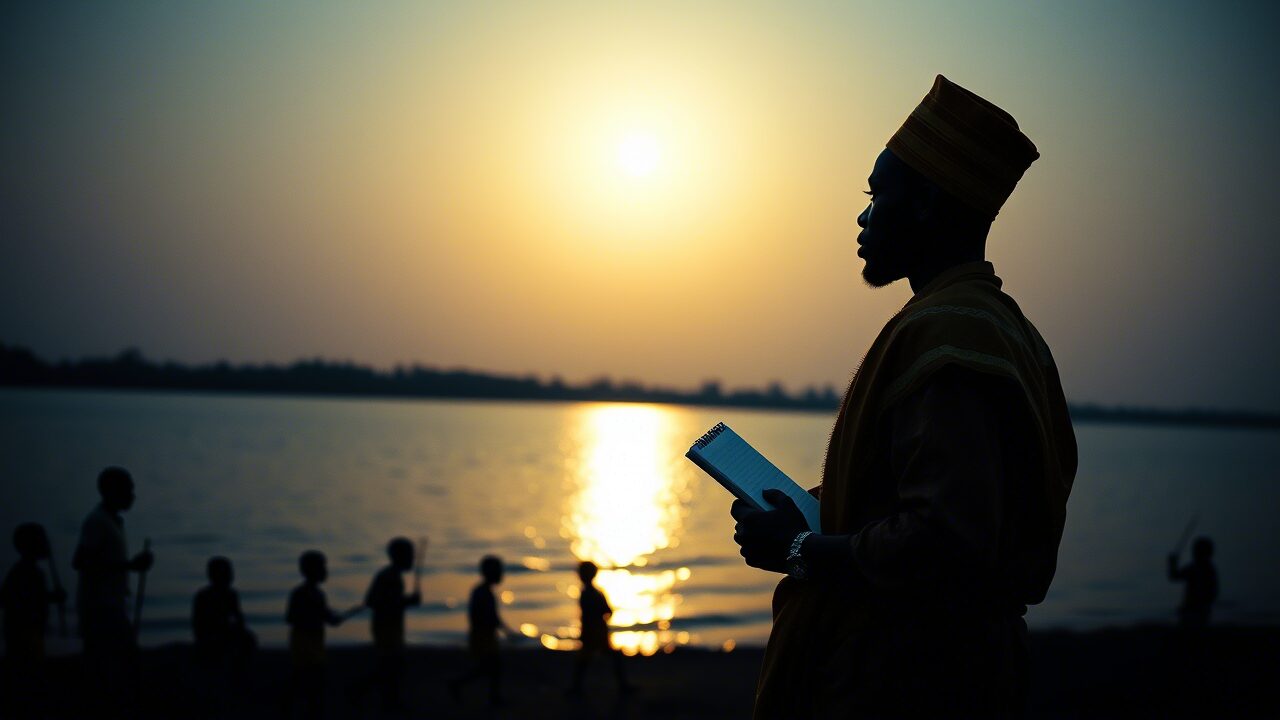
The narrative pulses with urgency as it traces Ocen’s journey from the sun-scorched plains of Gulu to the shadowy corridors of Kampala’s power brokers. Alongside him stride unforgettable characters: Okello, the charismatic yet conflicted politician whose ideals fray under the weight of pragmatism; Adong, the fiery revolutionary whose thirst for justice borders on self-destruction; and Ocen’s father, a chess-playing elder whose stories of pre-colonial unity haunt the next generation.
Rich in symbolism—the Nile as both witness and weapon, chessboards as maps of political manoeuvring, masks as emblems of hidden loyalties—the novel balances searing tragedy with biting satire. It lays bare the absurdity of leaders who preach unity while stoking division, and the resilience of communities clinging to hope amid systemic betrayal.
This is not just a story of Uganda’s past, but a mirror held to the enduring scars of post-colonial nations everywhere. The Shadow of the Nile is a masterful exploration of how history’s shadows linger, and how the fight for belonging can either fracture or forge a future. A must-read for fans of layered historical fiction unafraid to confront the interplay of power, identity, and the ghosts we inherit.
The Shadow of the Nile: A Tale of Blood, Betrayal, and Belonging in Post-Independence Uganda
The River Divides
It was said that the Nile whispered secrets to those who dared listen. And oh, how it whispered—its voice a low murmur threading through the sultry heat of post-independence Uganda, carrying tales as old as time itself. Tales of division. Of tribes torn asunder by lines drawn not with care but with greed, quills scratching maps in far-off London boardrooms where no one knew the scent of red earth or the taste of millet porridge under an African sun.
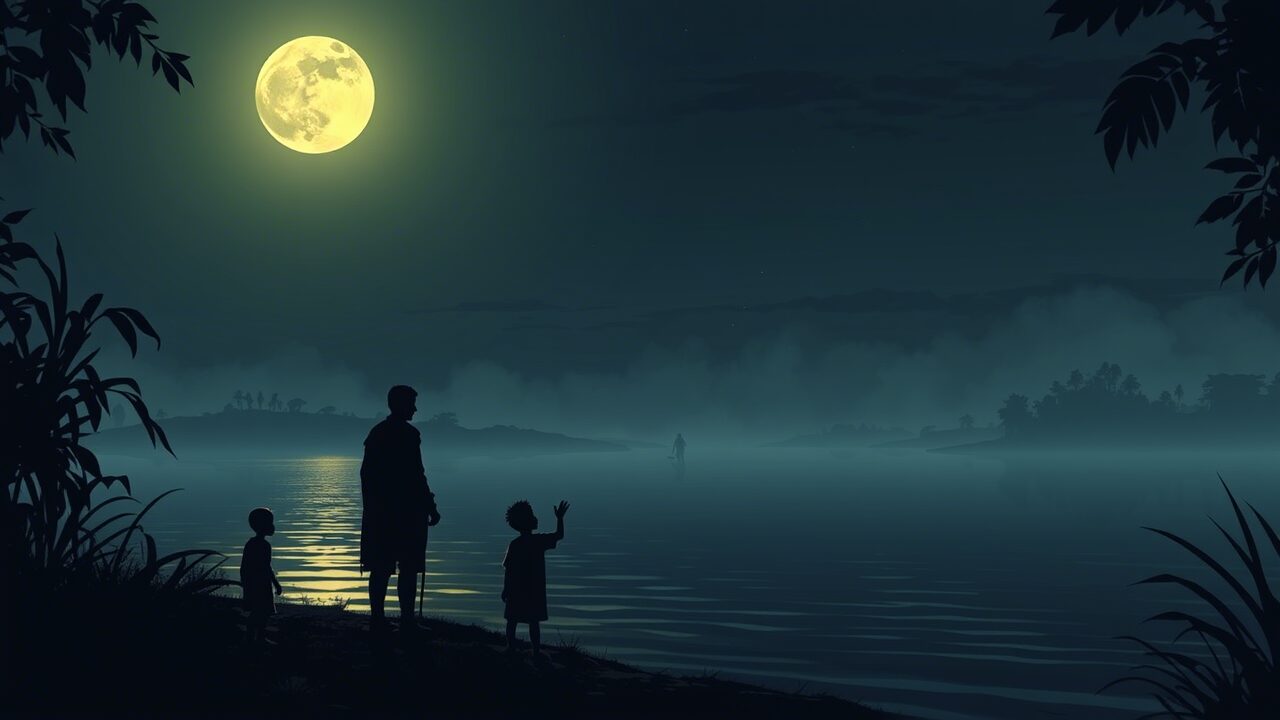
The river flowed on, majestic and indifferent, slicing through the heart of the nation like a blade honed too sharp. To the south lay fertile plains, kissed by rain and rich with promise—the domain of Bantu tongues singing hymns of prosperity. Here, fields stretched wide and green, villages thrummed with commerce, and dreams bloomed like jacaranda blossoms after the rains. But to the north? Ah, the north. A land of scrubland and savannah, baked dry by relentless equatorial heat, where Nilotic warriors stood sentinel against a world they no longer trusted. Their eyes were wary, their hearts heavy with memories of battles fought and lost before they were even born.
In Kampala, perched precariously atop the southern hills like an uneasy crown, politicians pirouetted in a macabre waltz. They wore suits tailored in Savile Row, their accents polished smoother than the marble floors of Parliament House. Yet beneath this veneer of civility lurked something darker—a scramble for power so fierce it left scars upon the land itself. To govern this fractured country, one had to choose: would you strengthen the centre at the expense of local pride? Or would you fan the flames of ethnic loyalty, knowing full well it might consume everything?
For Ocen, a young Acholi man born into the red dust of Gulu, these questions were not abstract debates over Earl Grey tea served in Parliament’s gilded halls. No, they were life or death. His father, once a respected elder in their village, now sat hunched over a chessboard in the dim glow of a kerosene lamp, muttering about kings and pawns. “They think we are simple,” he growled, moving a piece across the board with deliberate slowness. “But we know how to play games too.”
Ocen watched him carefully, his mind racing faster than the wind that swept across the northern plains. He had grown up hearing stories of the old days, when the Acholi people roamed free under vast skies unburdened by borders or bureaucrats. Back then, life moved to the rhythm of seasons and stars, not the ticking clock of colonial calendars. But those days felt like relics now, buried beneath layers of betrayal and broken promises. As independence dawned, the promise of self-rule had quickly soured into bitter infighting. And always, always, there was the spectre of the south—the Baganda, the Basoga, the Banyoro—all clamouring for dominance while casting suspicious glances toward the north.
Chapter One: The Chessboard of Power
Ocen’s father leaned back in his chair, exhaling smoke from his pipe. The air smelled faintly of tobacco and despair. Outside, crickets chirped in the darkness, their song punctuated by the occasional bark of a distant dog. It was a quiet night, yet the tension in the room was palpable.
“You see this?” his father asked, tapping the chessboard with a gnarled finger. “This is us. Every move matters. Every decision shapes what comes next.”
Ocen nodded, though he wasn’t entirely sure he understood. At nineteen, he was caught between worlds—too young to remember the days before independence, too old to believe the promises made afterward. All around him, he saw fractures widening: families divided, friends turned foes, communities splintered along invisible lines drawn long before any of them were born.
“Tell me again,” Ocen said softly, “about the time before.”
His father sighed, setting down his pipe. For a moment, he looked older than his years, his face lined with the weight of memories both cherished and cursed. “Before,” he began, his voice taking on the cadence of a storyteller recounting ancient lore, “there were no ‘north’ and ‘south.’ Only clans bound together by shared histories, shared struggles. We lived off the land, respected its rhythms. When the rains came, we planted. When the droughts struck, we endured. There was no need for titles or treaties because trust held us together.”
“And then?” Ocen prompted, though he already knew the answer.
“And then…” His father paused, his gaze drifting toward the window where moonlight spilled across the floor like silver ink. “Then they came. With their maps and their guns, their laws and their lies. They told us we were different—not just from them, but from each other. That our differences mattered more than our similarities. And slowly, bit by bit, we began to believe them.”
Ocen clenched his fists, feeling anger rise like bile in his throat. It wasn’t fair. None of it was fair. Why should his people bear the brunt of decisions made by men who’d never set foot in their villages, never tasted the bitterness of hunger during a bad harvest, never felt the sting of rejection when opportunities passed them by?
Chapter Two: Shadows in the Capital
Months later, Ocen found himself in Kampala, standing outside Parliament House for the first time. The building loomed large, its white columns gleaming in the midday sun. Around him, crowds gathered—some cheering, others jeering—as politicians emerged from within, their faces impassive masks hiding whatever truths lay beneath.
He had come seeking answers, though he wasn’t sure what form they would take. Perhaps it was naive to think he could make a difference, but naivety had a way of keeping hope alive when logic failed.
Inside, the atmosphere was electric. Men and women argued passionately, their voices rising and falling like waves crashing against rocks. Words like “unity” and “progress” hung in the air, hollow and empty, mere ornaments decorating a facade crumbling under the weight of its own contradictions.
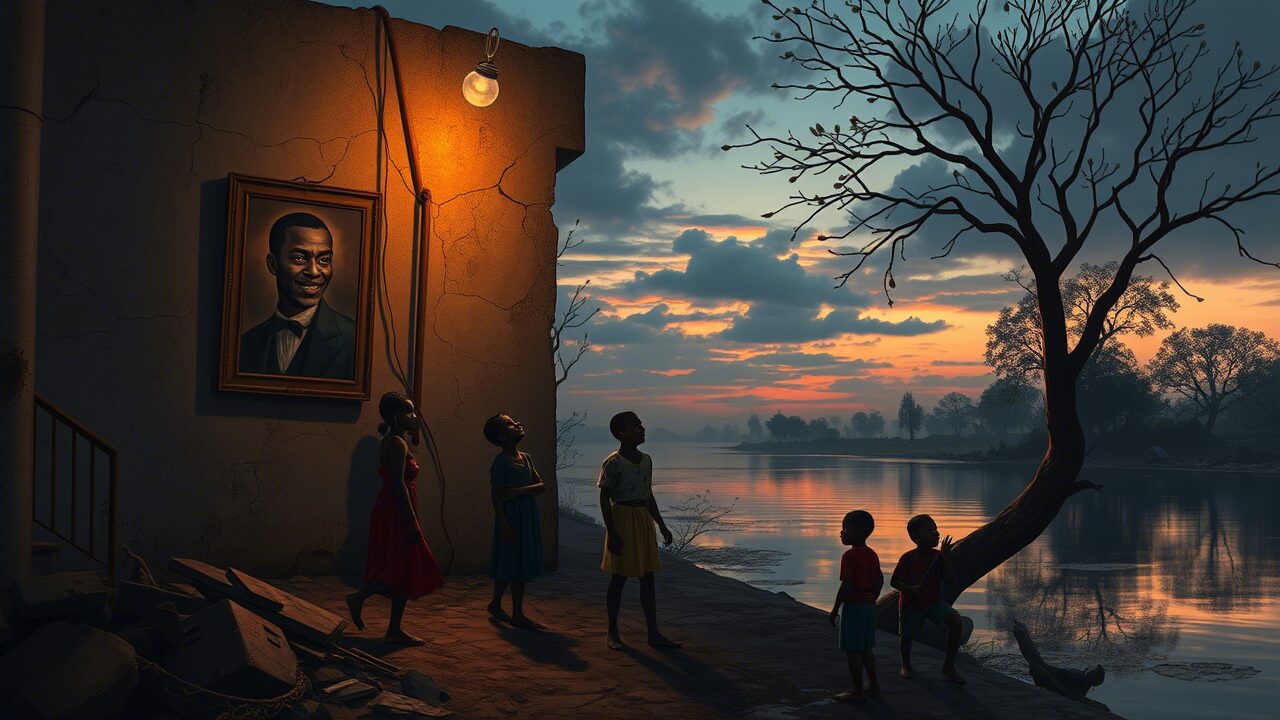
Ocen spotted Okello almost immediately. The man was impossible to miss—tall and commanding, his deep baritone cutting through the din like a machete through brush. “We are not beggars at the table of progress!” he declared, slamming his fist onto the podium. “We are the backbone of this nation, and we will not be ignored!”
The crowd erupted into cheers, but Ocen noticed something else too—the subtle shift in expressions among certain members of the assembly. Eyes narrowed, lips curled into faint sneers. These were men who didn’t trust passion, who preferred deals struck in shadowy corners over declarations shouted in broad daylight.
As the session ended, Ocen approached Okello cautiously. “Sir,” he began, extending a hand, “I’m Ocen. From Gulu.”
Okello turned, surprise flickering across his face before giving way to a warm smile. “Ah, another son of the north! What brings you here?”
“I want to help,” Ocen replied simply. “To understand.”
Okello studied him for a moment, then nodded. “Good. Because if we don’t fight for ourselves, no one else will.”
The Masks We Wear
Chapter One: Unity in Name Only
At first, the game was subtle—a delicate dance performed on the stage of post-independence Uganda. Politicians from both north and south spoke eloquently of unity, of forging a new nation out of the ashes of empire. They painted visions of prosperity and progress, their voices rising like hymns in Parliament House. Yet behind closed doors, alliances shifted like sand dunes in the wind. For every handshake offered, there was a dagger hidden in the sleeve.
In 1958, a charismatic Acholi leader named Okello emerged as a voice for the north. With his deep baritone and sharp wit, he charmed crowds and rattled opponents alike. “We are not beggars at the table of progress!” he declared during a rally in Lira, his words igniting cheers that echoed across the plains. “We are the backbone of this nation, and we will not be ignored!”
The crowd roared its approval, fists pumping in the air as if to punctuate his every syllable. To many, Okello was more than a politician; he was a symbol of hope, a beacon of defiance against decades of marginalisation. But beneath the surface, cracks began to form within his own ranks.
Some argued that clinging to the label of “northerner” only reinforced the divisions imposed by colonial rule. “Why should we define ourselves by their categories?” asked Akena, a young academic who had recently returned from studies abroad. “We are Ugandans first, last, and always.”
Others countered fiercely. “Without a united front,” retorted Lakwena, an elder with weathered hands and fire in her eyes, “the south will continue to exploit our resources and silence our voices. If we do not stand together now, when will we?”
It was a delicate balancing act, one that required navigating treacherous waters fraught with personal ambition and historical grievances. And yet, even as these debates raged, whispers spread of a different kind of rebellion brewing—one that threatened to upend everything.
Chapter Two: The Fire Within
Meanwhile, in the corridors of power, whispers spread of a different kind of rebellion brewing among the youth. Inspired by revolutionary movements sweeping across Africa—from Ghana’s independence to Algeria’s struggle against French colonialism—young men and women gathered in secret, plotting ways to overthrow what they saw as a corrupt system rigged against them.
Among them was Adong, Ocen’s childhood friend, whose fiery speeches often landed her in trouble with local authorities. She had grown up alongside him in Gulu, running barefoot through fields of sorghum and dreaming of a better future. But those dreams had curdled into something sharper, angrier—a burning desire for justice that consumed her entirely.
“If they won’t give us justice,” she told Ocen one evening as they sat by the fire, “then we’ll take it ourselves.”
Her words sent a chill down Ocen’s spine—not because he doubted her resolve, but because he feared where such convictions might lead. Already, rumours swirled of disappearances, of bodies found floating in the Nile. Was this truly the path to freedom, or merely another cycle of violence?
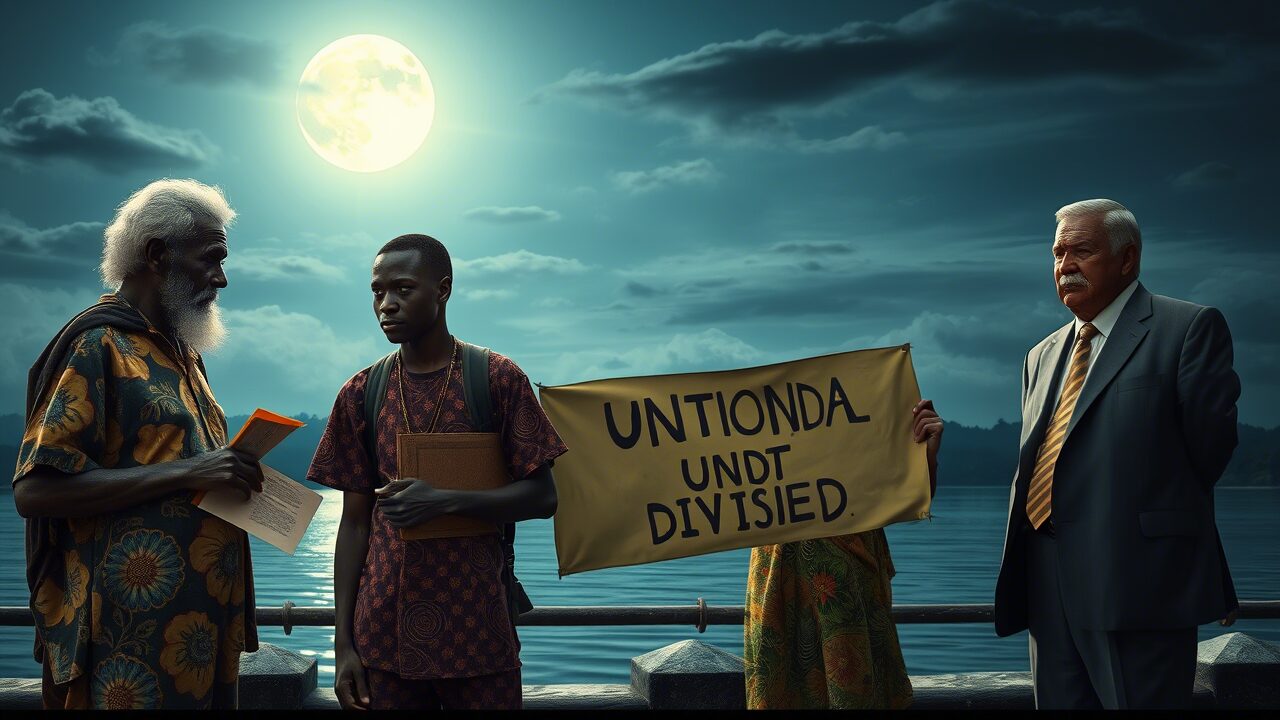
Ocen looked at her now, her face illuminated by the flickering flames. Her eyes burned with a ferocity that frightened him. “And what happens after you’ve taken it?” he asked quietly. “Will it be worth the cost?”
Adong hesitated, the firelight casting shadows across her features. “I don’t know,” she admitted finally. “But I can’t sit idly by while they carve up our lives like pieces of meat. Someone has to fight back.”
Ocen wanted to argue, to tell her that revenge would only breed more hatred, but the words caught in his throat. He knew she was right about one thing: doing nothing wasn’t an option either.
Chapter Three: Cracks in the Façade
Back in Kampala, Okello faced challenges of his own. His charisma had won him admirers, but it also made him enemies—men who saw his rise as a threat to their own ambitions. Chief among them was Musoke, a smooth-talking Muganda politician with a penchant for manipulation. Where Okello relied on passion and principle, Musoke excelled in subtlety and subterfuge.
“You’re playing a dangerous game,” Musoke warned during a private meeting, his tone deceptively casual. “Stirring up ethnic tensions may win you votes today, but it will tear this country apart tomorrow.”
Okello met his gaze steadily, refusing to flinch. “Ethnic tensions didn’t begin with me,” he replied coolly. “They were here long before independence—and they’ll remain unless someone addresses the root causes.”
Musoke smiled thinly, leaning back in his chair. “Perhaps. But remember this: revolutions rarely end well for their leaders. Ask yourself—is it worth sacrificing your future for theirs?”
For a moment, doubt flickered in Okello’s eyes. He thought of his family, his people, the weight of expectations pressing down upon him. Could he bear the responsibility? Did he have a choice?
As the meeting ended, Okello stepped out onto the balcony overlooking the city. Below, Kampala sprawled like a patchwork quilt, its beauty marred by scars of division. The Nile wound its way through the landscape, indifferent to the struggles of those who lived along its banks.
He sighed deeply, feeling the weight of the masks he wore—the public face of confidence and strength, the private doubts gnawing at his resolve. How much longer could he keep pretending?
Chapter Four: Shadows Across the Plains
In Gulu, life continued much as it always had—simple, hard, and unrelenting. Farmers tilled the red earth under the scorching sun, children played in dusty streets, and elders gathered beneath mango trees to share stories of old. But beneath the surface, tension simmered.
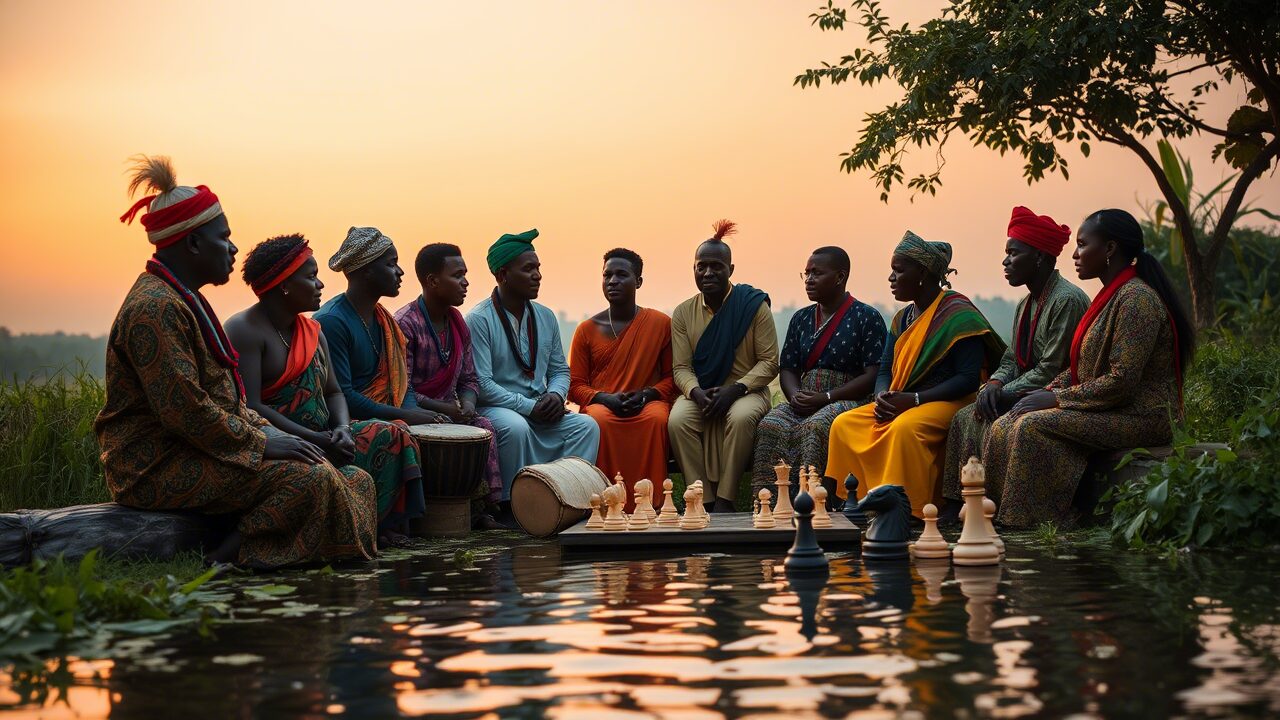
One afternoon, Ocen joined his father once again at the chessboard. The pieces stood frozen mid-game, reflecting the stalemate that seemed to define their lives. “What happens when the king falls?” Ocen asked suddenly, breaking the silence.
His father studied the board thoughtfully before replying. “Depends on who controls the rest of the pieces. Sometimes, the fall of one creates space for others to rise.”
Ocen frowned, turning the idea over in his mind. It reminded him of something Adong had said—that sometimes destruction was necessary for creation. But how far were they willing to go? How many sacrifices were too many?
That night, as he lay awake staring at the ceiling, Ocen heard distant voices carried on the wind. They sounded like whispers, faint but insistent, urging him to choose a side. To pick up a mask and wear it proudly—or to cast it aside and forge his own path.
But which path led to freedom? And which to ruin?
The Weight of History
Chapter One: Boiling Point
As the decade wore on, tensions reached a boiling point. The economic disparities between north and south widened like a chasm carved by relentless rains, fueling resentment and mistrust. In the south, fields flourished under the watchful eyes of Bantu farmers, their crops thriving in fertile soils kissed by abundant rainfall. Southern elites strutted through Kampala’s bustling streets, clad in finely tailored suits and speaking with accents polished smoother than Parliament House marble. They accused northerners of being backward and uneducated—a convenient narrative to justify their dominance.
In the north, however, the story was starkly different. Here, the land baked dry beneath an unforgiving sun, its red dust clinging stubbornly to everything it touched. Northerners retorted that their region had been deliberately neglected by successive governments—starved of resources, infrastructure, and opportunities. “They think we are simple,” muttered elders around flickering fires, “but they forget who built this nation while they sat counting coins.”
Meanwhile, foreign powers lurked in the shadows, eager to exploit the chaos for their own gain. Diplomats whispered promises of aid and investment, their smiles as sharp as the blades hidden beneath silk robes. Behind closed doors, deals were struck, alliances forged—and betrayals plotted—all in the name of geopolitical advantage.
By 1968, the fragile facade of national unity had all but crumbled. What remained was a brittle shell, cracked and splintered by years of neglect, greed, and fear. Acholi politicians, sensing their influence slipping away, began to shift their rhetoric. No longer content to speak solely of regional interests, they embraced a more radical form of ethnonationalism—one rooted in pride, identity, and resistance. It was a gamble, fraught with risks, but also a reflection of desperation. If the state refused to acknowledge their humanity, then perhaps they could forge a new identity altogether—one untethered from the constraints of colonial legacies.
Yet as Ocen listened to these impassioned speeches, he couldn’t shake the feeling that something vital was being lost. The stories his father told of a shared past, of communities bound together by mutual respect rather than fear—it all seemed so distant now. Had they traded one master for another, only to find themselves enslaved by their own divisions?
Chapter Two: A New Identity
Ocen stood at the edge of a crowded rally in Lira, watching as thousands gathered to hear Okello deliver yet another rousing speech. The air buzzed with anticipation, charged with the electricity of hope and defiance. Women draped in vibrant fabrics clutched banners emblazoned with slogans like “Pride Over Division” and “Unity Through Resistance.” Men pounded drums, their rhythms echoing across the plains like thunder rolling over distant hills.
When Okello finally stepped onto the makeshift stage, the crowd erupted into cheers. His deep baritone cut through the din, commanding attention without effort. “Brothers and sisters!” he bellowed, raising a fist high above his head. “For too long, we have allowed others to define us—to tell us who we are and what we can become. But today, we reclaim our destiny! Today, we rise as Acholi—not as victims of history, but as architects of the future!”
The audience roared its approval, fists pumping in unison as if driven by some invisible force. Yet amidst the fervour, Ocen felt a pang of unease. He glanced around at the sea of faces, searching for signs of doubt or hesitation—but found none. Instead, there was only certainty, conviction, and a hunger for change.
Later that evening, Ocen approached Okello cautiously. The politician sat alone in a dimly lit tent, sipping tea and staring pensively at a map spread across the table before him. “You spoke well today,” Ocen said softly, breaking the silence.
Okello looked up, offering a weary smile. “Thank you, my boy. But words are cheap. It’s actions that matter.”
Ocen hesitated, choosing his next words carefully. “Do you ever worry… that we’re replacing one set of chains with another? That by focusing so much on ethnic pride, we risk losing sight of what binds us together?”
Okello sighed deeply, setting down his cup. For a moment, he seemed older than his years, the weight of leadership etched into every line of his face. “I ask myself that question every day,” he admitted quietly. “But tell me, Ocen—what choice do we have? When the system is rigged against you, sometimes the only way forward is to break it entirely.”
Ocen nodded slowly, though uncertainty lingered in his heart. Was breaking the system truly the answer? Or would it simply create space for new forms of oppression to take root?
Chapter Three: Foreign Shadows
In Kampala, the corridors of power buzzed with activity as diplomats and lobbyists jockeyed for influence. Among them was Mr. Whitmore, a British attaché whose charm masked a calculating mind. With silver hair and a perpetually affable demeanour, he moved effortlessly among Uganda’s elite, dispensing advice and assurances with equal ease.
“Ah, Minister Musoke,” Whitmore greeted warmly during a private meeting, extending a hand adorned with an expensive wristwatch. “How goes the campaign for centralisation? We’re eager to support any efforts toward stability.”
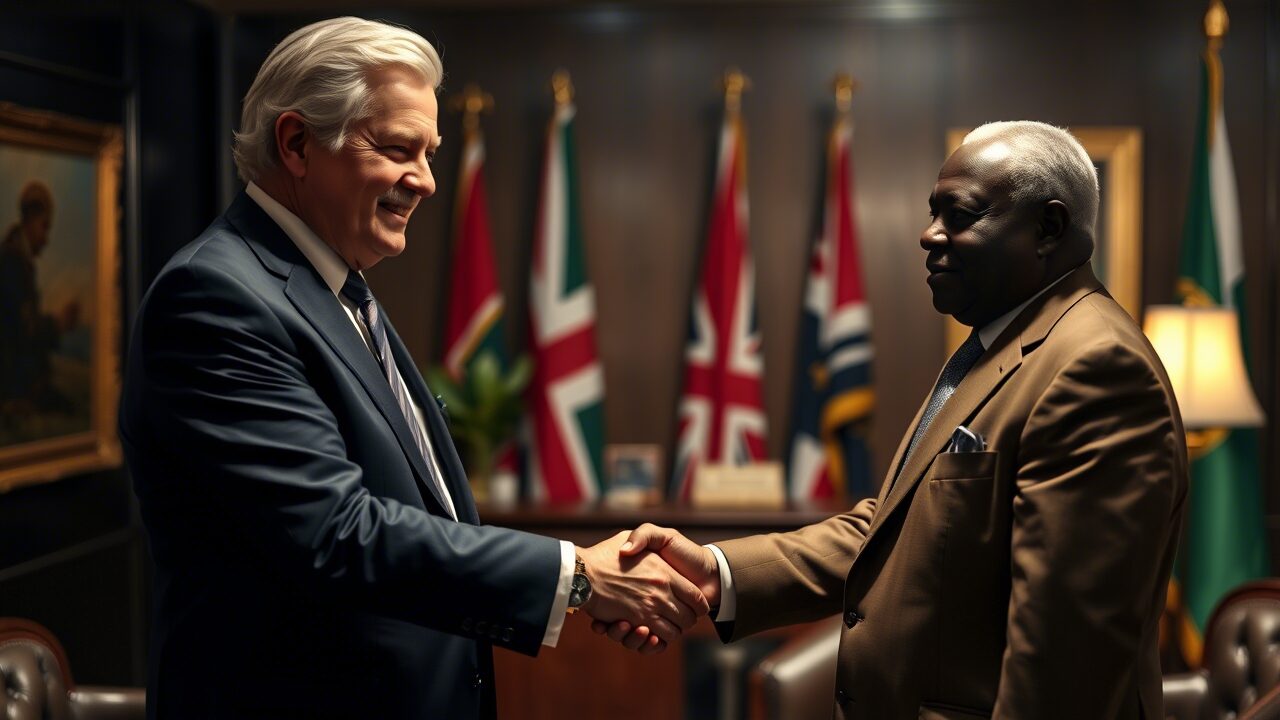
Musoke smiled thinly, accepting the handshake but keeping his distance. “Stability is a delicate balance, Mr. Whitmore. Too much pressure, and the whole thing collapses.”
Whitmore chuckled, leaning back in his chair. “Indeed. But isn’t that why we’re here—to help maintain equilibrium?” His tone was light, almost playful, yet there was no mistaking the underlying threat. Foreign powers had invested heavily in Uganda’s resources, and they weren’t about to let internal strife disrupt their plans.
As the meeting concluded, Musoke watched Whitmore depart, his expression unreadable. He knew the game being played—the subtle manipulations, the veiled threats, the promises dangled like carrots before donkeys. And yet, he couldn’t deny the allure of foreign backing. After all, power was a fickle mistress, and loyalty came at a price.
Chapter Four: Echoes of the Past
Back in Gulu, Ocen found himself drawn once again to the banks of the Nile. The river flowed steadily, its waters whispering secrets to those who dared listen. As he gazed out at the shimmering expanse, memories of his father’s stories flooded his mind—tales of a time when clans lived side by side, bound not by ethnicity but by shared struggles and triumphs.
“We’ve forgotten how to trust each other,” Ocen murmured aloud, his voice barely audible over the rush of water. “And now, we’re paying the price.”
Adong joined him moments later, her fiery presence a stark contrast to the tranquil scene. “Trust doesn’t feed families, Ocen,” she replied sharply. “Action does.”
He turned to face her, noting the determination in her eyes. “But at what cost, Adong? Are we fighting for freedom—or just swapping one cage for another?”
She hesitated, her usual bravado faltering slightly. “Maybe both,” she admitted quietly. “But standing still isn’t an option either.”
Ocen sighed, turning back to the river. Its currents swirled and eddied, carrying fragments of leaves and twigs downstream. Like the water, life moved inexorably onward, shaped by forces beyond individual control. Perhaps the true challenge lay not in resisting the flow—but in learning to navigate it.
Whispers on the Wind
Chapter One: Echoes of Silence
Years later, standing on the banks of the Nile, Ocen gazed out at the water shimmering under the moonlight. The river stretched endlessly before him, its surface rippling with silver reflections that danced like ghosts in the night. It was quiet now—eerily so. The war drums had long since fallen silent, their thunderous beats replaced by the gentle lapping of waves against the shore. But their echoes lingered still, faint whispers carried on the wind, reminders of battles fought and lives lost.
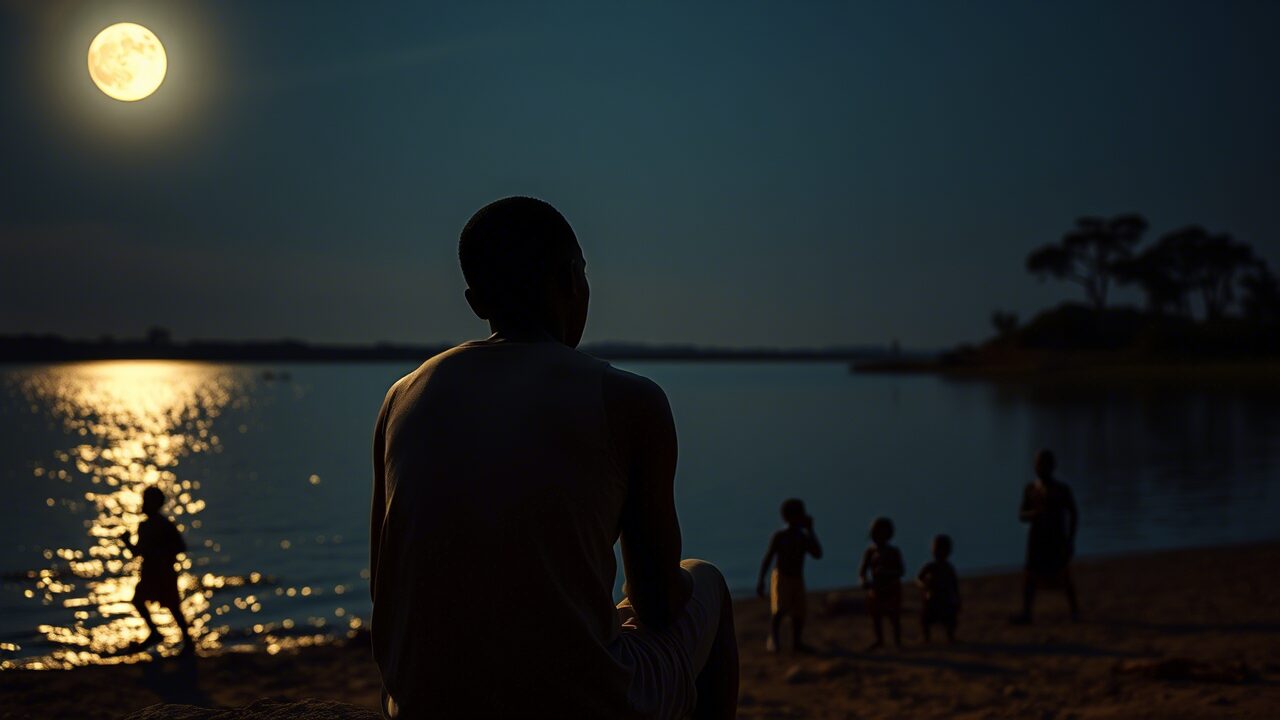
Around him, children played, their laughter ringing out like bells in the cool evening air. They chased each other barefoot across the sand, oblivious to the weight of history pressing down upon the land they called home. Somewhere in the distance, a song drifted through the air—a haunting melody sung by an unseen voice, its notes weaving together threads of hope and heartbreak intertwined. Ocen closed his eyes, letting the sound wash over him, feeling both comforted and unsettled by its familiarity.
He thought of Adong, who had disappeared one night without a trace. She had been so full of fire, her words sharp as machetes cutting through the tangled vines of injustice. He remembered the last time he saw her, her face illuminated by flickering candlelight as she spoke passionately about freedom. “If we don’t fight for it,” she’d said, “who will?” And then she was gone, swallowed by the shadows, leaving behind only questions and grief.
He thought of Okello too, whose dreams of equality had been slowly eroded by the insatiable maw of politics. Once a beacon of hope, Okello had become something else entirely—a man consumed by ambition, his ideals traded for power. Ocen recalled the final meeting between them, years ago, when Okello sat hunched over a map, tracing lines with trembling fingers. “Sometimes,” he’d muttered bitterly, “you have to choose between what’s right and what’s possible.” Those words had haunted Ocen ever since.
And finally, he thought of his father, who had died believing that someday, somehow, the river would carry them back to a place of peace. His father had always spoken of the past with reverence, painting vivid pictures of a time when clans lived side by side, bound not by ethnicity but by shared struggles and triumphs. “The river remembers,” he used to say, tapping the chessboard with deliberate slowness. “It holds all our stories within it.”
Ocen opened his eyes, staring once more at the water. Did the river truly remember? Or was it simply indifferent, flowing onward regardless of the lives it touched?
Chapter Two: Fragments of Light
Despite the weight of memory, Ocen allowed himself a small smile. For even in the darkest moments, there were glimmers of light—fragile, fleeting, but real nonetheless. He saw it in the children playing nearby, their innocence untainted by the scars of history. He heard it in the distant song, its melody rising above the silence like a bird taking flight. And he felt it deep within himself, a stubborn spark refusing to be extinguished.
Perhaps, he thought, the true challenge lay not in erasing the past, but in learning to live with its ghosts. To acknowledge their presence without letting them consume you. To honour the sacrifices made while striving toward a better future. It was a delicate balance, one that required courage, patience, and faith.
As he stood there, lost in thought, a young boy approached him hesitantly. “Uncle Ocen,” the child asked, tugging gently at his sleeve, “why does the river shine like stars?”
Ocen knelt down, meeting the boy’s curious gaze. “Because it carries the light of everyone who has ever lived along its banks,” he replied softly. “Every story, every dream, every tear—it’s all part of the river now.”
The boy frowned, tilting his head to one side. “Even the sad stories?”
“Especially the sad ones,” Ocen said, smiling gently. “Because sometimes, sadness helps us find strength we didn’t know we had.”
The boy nodded solemnly, seemingly satisfied with the answer, before running off to join his friends. Ocen watched him go, marveling at the resilience of youth. How easy it must be, he thought wistfully, to see the world as a blank slate rather than a tapestry woven with pain and promise.
Chapter Three: A New Song
Later that evening, as the sky darkened and the stars emerged one by one, Ocen returned to his village. The streets were alive with activity—women preparing meals over open fires, men gathered beneath mango trees sharing stories, elders seated in circles discussing the day’s events. Life moved forward, as it always did, carrying with it the hopes and fears of those who lived it.
Inside his modest home, Ocen lit a kerosene lamp and pulled out an old notebook filled with scribbled thoughts and half-finished poems. Writing had become his solace, a way to make sense of the chaos swirling around him. Tonight, however, he felt compelled to write something different—not a lament for what had been lost, but a hymn for what could still be found.
He dipped his pen into the inkwell and began:
The river flows, unyielding and free,
Carrying whispers from sea to tree.
In its depths lie tales untold,
Of hearts broken, yet brave and bold.
For though the night may stretch long,
And shadows sing their mournful song,
There is light within the darkest tide,
A flicker of hope where none can hide.
When he finished, Ocen leaned back in his chair, reading the words aloud to himself. They weren’t perfect, but they felt honest—and sometimes, honesty was enough.
Chapter Four: The River Remembers
Days turned into weeks, and life continued much as it always had. Farmers tilled the red earth under the scorching sun, traders bartered goods in bustling markets, and elders gathered beneath mango trees to share stories of old. Yet amidst the routine, subtle changes began to emerge. Conversations grew less guarded, laughter rang out more freely, and bridges—however fragile—started to form between communities once divided by mistrust.
One afternoon, Ocen joined a group of villagers near the riverbank, where they were planting saplings along the shoreline. “Why are we doing this?” a young girl asked, wiping sweat from her brow.
“To give back to the river,” one of the elders explained, patting the soil firmly around a newly planted tree. “It has given us life for generations. Now it’s our turn to care for it.”
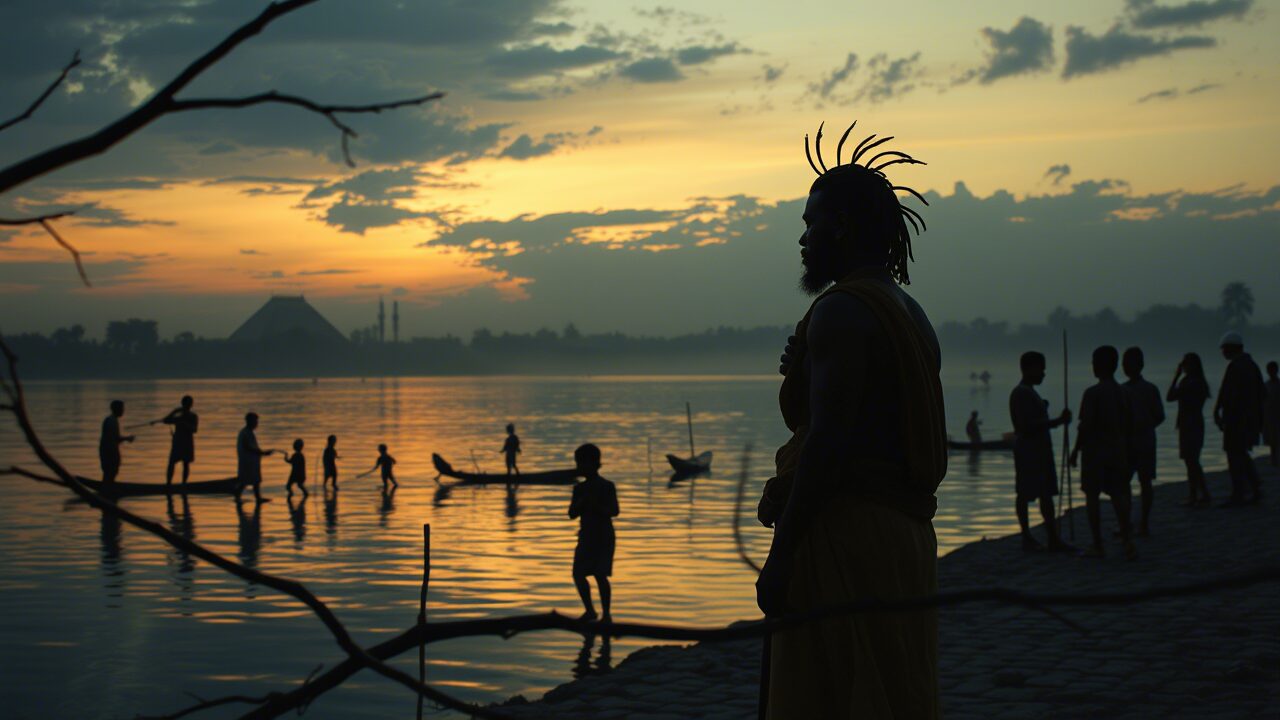
Ocen smiled, watching as hands worked together in harmony. Perhaps this was how healing began—not with grand gestures or sweeping reforms, but with small acts of kindness and cooperation. By nurturing the land, they were also nurturing themselves.
As the sun dipped below the horizon, casting the sky in hues of orange and crimson, Ocen walked alone to the edge of the water. He knelt down, dipping his fingers into the cool current, and whispered softly, “Thank you.”
Whether the river heard him or not, he couldn’t say. But as he rose to his feet, he felt a strange sense of peace—a quiet certainty that, despite everything, life would endure. Like the river itself, it would flow onward, carrying fragments of the past into the promise of tomorrow.
Themes and Tone
Whispers on the Wind is a poignant exploration of memory, resilience, and renewal set against the backdrop of post-conflict Uganda. Through characters like Ocen, Adong, and Okello, it delves into themes of loss, identity, and reconciliation, blending humour, tragedy, and satire into a narrative that challenges readers to confront uncomfortable truths while holding onto hope.
Humour emerges in unexpected places—like the absurdity of politicians debating unity while secretly plotting division—and serves as a counterpoint to the darker themes of betrayal, loss, and violence. At its core, the story asks: Can a nation heal when its wounds run so deep? Is it possible to forge a new identity without erasing the lessons of the past?
Amidst the chaos, there are moments of beauty—whispers of hope carried on the wind, fleeting glimpses of humanity shining through the cracks. Like the Nile itself, the story flows inexorably onward, weaving together threads of suspense, heartbreak, and heroism into a tapestry both haunting and unforgettable.
Themes:
This story weaves together elements of tragedy, suspense, and satire, exploring the complexities of ethnic conflict in post-independence Uganda. Through vivid characters and evocative imagery, it delves into themes of identity, power, and resilience, inviting readers to reflect on the enduring legacy of colonialism and the human capacity for both destruction and renewal.
- The NUP Corruption Allegations: A Sign of a Deeper Political Failure? - 8 September 2025
- Ugandan Politics Exposed: The Illusion of Choice and Managed Opposition - 6 September 2025
- Bobi Wine & NUP Corruption: The Inside Story of Uganda’s Opposition Crisis - 5 September 2025

